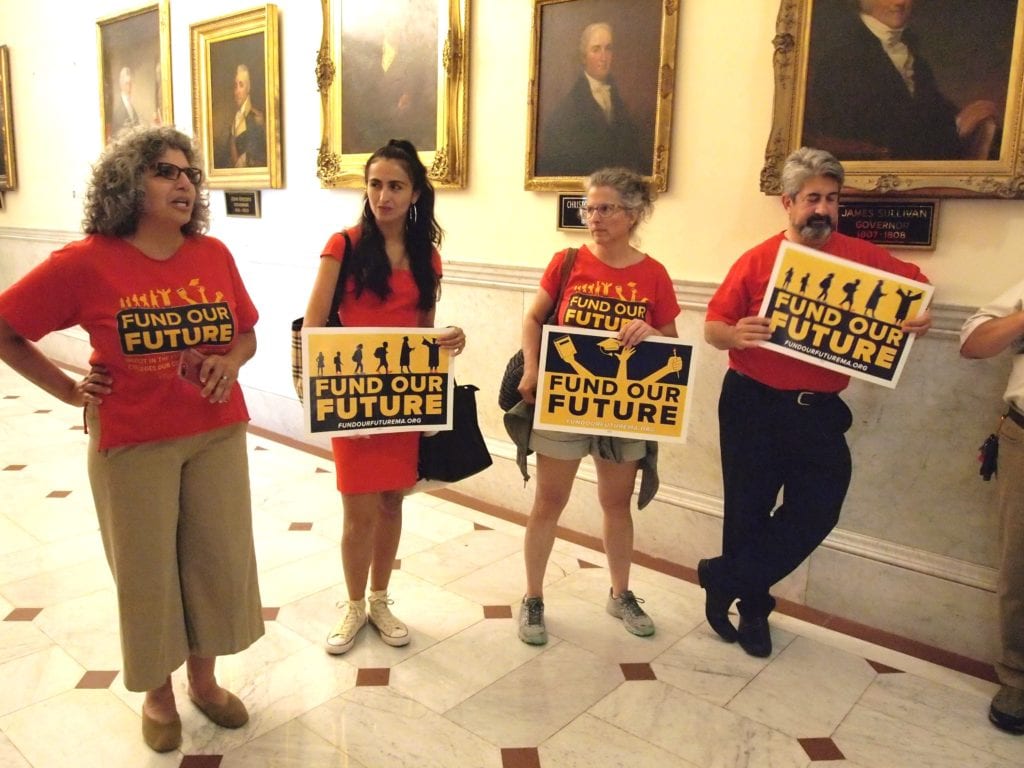Teachers press for ed. funding
Legislature stalled in negotiations over education funding increase

Every year, Roxanne Campbell shells out hundreds of dollars for scales, thermometers and other supplies for her middle school science class, a common dilemma faced by teachers in Revere.
“In the core subjects, if they have textbooks, they’re woefully outdated,” Campbell says. “But most of us spend a lot of time creating our own materials because we don’t have textbooks.”
Last Thursday, Campbell joined several dozen activists with the Massachusetts Teachers Union for a demonstration at the State House, demanding that legislators pass a bill to increase education funding.

Standing outside the office of Senate President Karen Spilka, UMass Boston student Luz Johanna Perez Borbon reads from a bound volume of testimony on the need for education funding. BANNER PHOTO
Lawmakers on the Education Committee have for weeks been working to iron out a compromise between differing visions of education funding reform. On one side are legislators who support Sen. Sonia Chang-Diaz’s Promise Act, which would raise funding by $1 billion. On the other are legislators who are demanding enhanced accountability measures be included with an increase in funding.
The accountability measures being debated include provisions that would give the state’s Department of Elementary and Secondary Education greater latitude in taking over schools deemed to be failing.
Lawmakers have given few details on the closed-door negotiations, leaving education activists unsure as to whether a funding reform bill will pass before the legislators go on recess this summer.
“It really has been quite silent,” said Massachusetts Teachers Association President Merrie Najimy, who joined teachers and parents in the demonstration at the State House. “All we keep hearing is that they’re in committee and they’re working on it.”
Monday, House Speaker Robert DeLeo acknowledged that the House and Senate may not reach agreement on the budget by the end of the month. Legislative leadership would not comment specific disagreements in the budget.
Education Committee co-Chairman Sen. Jason Lewis told Najimy and the other demonstrators that education funding is the top issue for legislators this year.
“The Senate really sees this as an equity issue,” he said, speaking to the demonstrators in Nurses Hall. “Schools that serve low-income students and black and brown students are not able to provide the same level of resources as higher-income school districts that are predominantly white.”
Lewis also said many legislators are concerned about attempts to increase mandates for testing and provisions for greater state intervention in struggling districts.
“Just as important as what’s in this bill is what’s kept out,” he said. “The broader issue of new accountability systems is not something we’ll address with funding legislation. The main focus of the bill is to fund our schools.”
The activists visited the offices of Senate President Karen Spilka and Education Committee co-Chairwoman Alice Peisch, where they met with aides, and House Speaker Robert DeLeo, where a court officer blocked their entrance.
Members read from a bound volume of 700 hand-written letters from students, parents and teachers calling for funding reform.
In contrast to Lewis, Peisch has expressed support for greater accountability measures in the education bill and has expressed support for so-called empowerment zones, a set of underperforming schools in a district that would be given greater autonomy over hiring and hours of operation. In one proposal being considered by legislators, the state’s secretary of education would have to the power to establish empowerment zone within districts. Teachers unions have opposed such measures, calling instead for greater funding without additional measures.
The Education Reform Act of 1993 established the accountability regime under which school districts currently function. That legislation increased funding for schools and also introduced the MCAS exam. It established a five-level system wherein schools with high test scores, attendance rates and graduation rates are assigned level 1 status. Schools that are at level 4 are required to submit turnaround plans, including the removal of as much as half the teaching staff.
Level 5 schools are taken over by the state. The state’s record with such schools has varied. In Lawrence, a district that was under state control, many praise the academic gains students have made. At the Dever School in Dorchester, which was taken over by the state, a highly-paid private contractor failed to produce positive results. The school was returned to BPS control last year.
Resistance to accountability measures and school takeovers is increasing in Massachusetts and around the country, education activists say.
In the lobby of Peisch’s office, Hull teacher Debbie McCarthy told an aide that all 10 Democratic presidential candidates who turned out for the National Education Association Representative Assembly agreed that U.S. schools do not need more accountability measures.
“The message is really clear,” she said. “This is not about accountability. This is about funding. It’s time to fund our schools. No more poison pills.”







